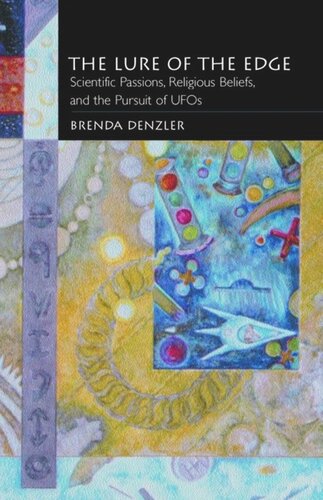

Most ebook files are in PDF format, so you can easily read them using various software such as Foxit Reader or directly on the Google Chrome browser.
Some ebook files are released by publishers in other formats such as .awz, .mobi, .epub, .fb2, etc. You may need to install specific software to read these formats on mobile/PC, such as Calibre.
Please read the tutorial at this link: https://ebookbell.com/faq
We offer FREE conversion to the popular formats you request; however, this may take some time. Therefore, right after payment, please email us, and we will try to provide the service as quickly as possible.
For some exceptional file formats or broken links (if any), please refrain from opening any disputes. Instead, email us first, and we will try to assist within a maximum of 6 hours.
EbookBell Team

4.8
34 reviewsUFO phenomena entered American consciousness at the beginning of the Cold War, when reports from astonished witnesses of encounters with unknown aerial objects captured the attention of the United States military and the imagination of the press and the public. But when UFOs appeared not to be hostile, and when some scientists pronounced the sightings to be of natural meteorological phenomena misidentified due to "Cold War jitters," military interest declined sharply and, with it, further overt scientific interest.
Yet sighting reports didn't stop and UFOs entered the public imagination as a cultural myth of the twentieth century. Brenda Denzler's comprehensive, clearly written, and compelling narrative provides the first sustained overview and valuation of the UFO/alien abduction movement as a social phenomenon positioned between scientific and religious perspectives. Demonstrating the unique place ufology occupies in the twentieth-century nexus between science and religion, Denzler surveys the sociological contours of its community, assesses its persistent attempt to achieve scientific legitimacy, and concludes with an examination of the movement's metaphysical or spiritual outlook. Her book is a substantial contribution to our understanding of American popular culture and the boundaries of American religion and to the debate about the nature of science and religion.
Denzler presents a thorough and fascinating history of the UFO/abduction movement and traces the tensions between those who are deeply ambivalent about abduction narratives that seemingly erode their quest for scientific credibility, and the growing cultural power of those who claim to have been abducted. She locates the phenomenon within the context of American religious history and, using data gathered in surveys, sheds new light on the social profile of these UFO communities. The Lure of the Edge succeeds brilliantly in repositioning a cultural phenomenon considered by many to be bizarre and marginal into a central debate about the nature of science, technology, and the production of a modern myth.